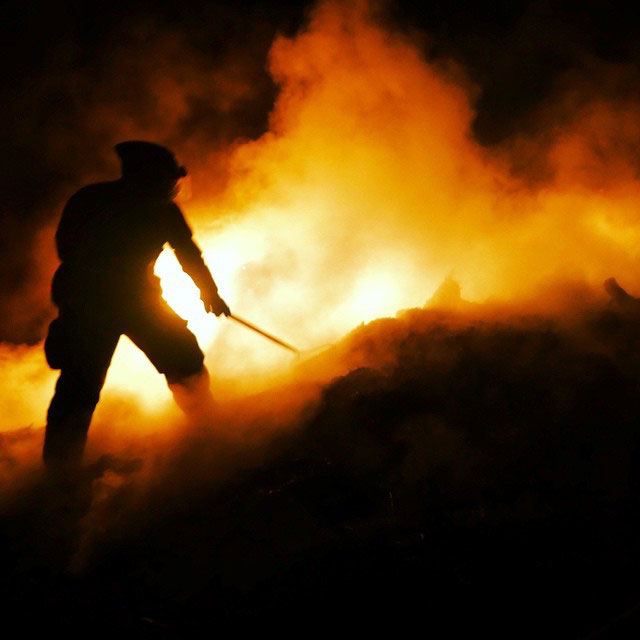What It Feels Like To Save a Life
As told by Marianne Peistrup, Kerry McWilliams, Jamie White and Captain Andrew Ploskni.
Sirens wailing, people sprinting towards the door.
A fire nearby needs to be tamed.
One minute: the expected time to be ready and speeding down the road in full gear ready to fight a fire.
From mid-sleep to a full out sprint, I’m in a mad dash to save a life.
The life of a firefighter isn’t the life for everyone. It’s demanding, time consuming and incredibly taxing on the body and mind. With all of the calls and opportunities to help someone in need, not all moments are seized. Analyzing each call gone bad only tear me down and eventually lead to rupturing my breaking point. My hardships are often coped by laughter and jokes commonly distributed throughout the station. Without it, one can not mentally survive. It doesn’t take very long to see who is cut out to survive in this workforce; the workforce of saving lives and putting one’s own life at risk to save others. The job of a firefighter.
Every kid dreams to be one, but very few obtain the title. I had that dream. It’s not easy, and those who do possess the dream most definitely do not view themselves as fulfilling the label: a hero.
In the eyes of a firefighter, it’s just another day in the office. Knowing someone’s life goes on thanks to the help of another is an amazing feeling to an ordinary civilian, but for a firefighter, it’s what I signed up for.
Bonds are created like no other at the station. The word coworker doesn’t exist here. Family does.
12:30 a.m.
After a long, busy day of calls I finally get to rest my head. Some days, like today, are jam packed with calls, while others are slow. I sit, anticipating a call at any second. Oh, my bed, how I’ve missed you so much. My bed has never felt more comfortable and feels as if it was designed just for me. Finally, I get to catch some shut eye, trying not to think of today’s calls. Can’t analyze it, all apart of the job I tell myself.
2:45 A.M.
WEEEE-000 WEEEE-ooo
I’m up, disregarding the amount of sleep I didn’t get. I’m jumping out of bed simultaneously with the rest of the crew. Everyone, listening to the call, makes a quick adjustment to being awake and takes off to the rig.
This is not my first rodeo. Right out the door to my left is all my gear. I quickly throw on everything and I’m ready to go. I look down at my watch. Fifty three seconds, not too shabby. It’s not very long until we’re all on the rig and pulling out of the station. I know this firetruck along with all the others like the back of my hand. Everyday we check them. I’ve memorized them inside and out.
Hot out the gates and ready for action.
I hear over the call that there is a fire and a 13-year-old girl is still inside the house. I’m familiar with the address and know it’s right across town. I don’t care what time of day it is. There is no better feeling than having that adrenaline rush through you while speeding down the road with the sirens blaring. As we finally are approaching, I see an ambulance pull up as well.
As quick as my crew and I jumped on the rig, we are just as fast and eager to jump off. I hit the ground running.
Back in training, there was no instructor that can fully prepare you for the situations you’ll face on calls. There’s no rule book thats says, “Okay, this is how fires will go, here is step A followed by step B.”
No.
Every situation is different and you can only be supplied with the right knowledge and tools to work with during a fire. You have to think on your feet. Anything, absolutely anything, can happen.
While running in, the mother of the teen said she is in her room; the second door on the left through the hallway. Instantly from there, the captain and I charge through the door. By this time, the fire is building up and we have to be quick. If we don’t find the girl in time, the stifling smoke could go into her lungs and burn her from the inside out, thus bringing her heart to a screeching halt.
Seeing the fire spreading from the kitchen with smoke surrounding us, we act fast. As we maneuver our way into her room, we see her, laying on the floor covering her mouth with a blanket, coughing. We are quick to carry her and move her out of the house. As soon as we get outside, the medics come over. It’s easy to see she’s having trouble breathing.
It’s all protocol now.
The medics see she is having an anxiety attack and her heart is speeding up. “When we give you this medicine we are going to stop your heart and get it going again so your heartbeat gets back to normal.” Anyone would be scared by those words. She looks at me and grabs my hand for comfort. I’m more than welcome to hold her back.
Her heart flatlined for a second.
Before you know it, she’s right back with us, normal heartbeat and all.
Back to the station. Time to catch up on that sleep. It’s a good feeling knowing she is still here with us today because of our help. The most rewarding feeling was when I saw her again the following week visiting the station with a thank you note. That feeling is why I love this job. It will forever be hung up on my wall, but at the end of the day, it’s all a part of the job.


